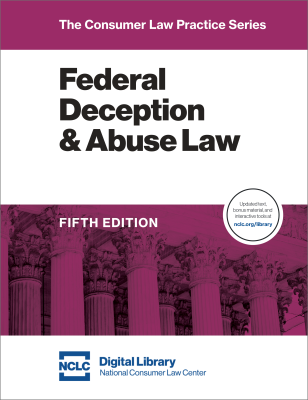False Claims Act Overview
The Supreme Court’s 9-0 holding in Cochise Consultancy, Inc. v. United States ex rel. Hunt, 2019 WL 2078086 (U.S. May 13, 2019), highlights one of the many advantages of challenging consumer abuses through the federal False Claims Act (FCA), 31 U.S.C. § 3729, et. seq. The FCA allows whistleblowers to file suit, on behalf of the United States, against companies making false claims to the government. The whistleblower (called a “relator”) can recover a percentage of a treble damages recovery and also attorney fees. Often the United States takes over the litigation, but the relator still shares a percentage of the recovery. Many such cases benefit not just the government and the whistleblower, but consumers in general.
Almost any action that involves fraud in attempting to obtain payment of government funds or falsely certifying compliance with government requirements may constitute a violation under the Act. The FCA is “intended to reach all types of fraud, without qualification, that might result in financial loss to the Government.” United States v. Neifert-White Co., 390 U.S. 228, 232 (1968). While there must be some connection between the fraud and the government, such frauds often also injure consumers. For example where the goods are purchased both by the federal government and by consumers, an FCA claim may involve a company that makes false representations to the government that it is complying with federal requirements in dealing with consumers or that makes false representations about such goods. More on the FCA is found in NCLC’s Federal Deception Law Chapter 9.
The Holding in Cochise Consultancy
The FCA provides a statute of limitations that is the longer of (1) six years from when the statutory violation occurred or (2) three years from when the U.S. official responsible to act in the circumstances knew or should have known the relevant facts, but not more than ten years after the violation. 31 U.S.C. § 3731(b). Cochise Consultancy holds that the application of this second part of the limitations period is not limited only to when the United States takes over a case. The second limitations period also applies to relators bringing their own FCA actions and the three year time begins to run not when the relator learns of the facts, but when the relevant United States official learns of the facts.
In the appropriate circumstances, such as when a United States official learns of the facts shortly before or when a lawsuit is filed, a limitation period as long as ten years from when the violation occurred may be allowed. This limitations period—anywhere from six to ten years—is longer than almost any limitations period under any federal or state consumer statute.
Other Advantages of an FCA Cause of Action
In addition to a longer statute of limitations period, FCA claims have the following advantages:
- Arbitration requirements do not apply because the consumer is bringing the action on behalf of the United States, not the consumer. See NCLC’s Federal Deception Law § 9.5.
- Class action requirements do not apply even when the abuse is widespread, because the plaintiff is the United States seeking damages for all false claims submitted to the government.
- A successful action can recover civil penalties, treble damages, attorney fees, costs, and expenses.
- The expense to a relator of litigating a case is offset by the ability to obtain a significant percentage of the recovery plus attorney fees. If the United States takes over the case, expenses are borne primarily by the government, but the relator still receives a percentage of the recovery.
- Federal court jurisdiction is available, with supplemental jurisdiction over related state claims, such as state false claims acts.
See generally NCLC’s Federal Deception Law § 9.2.1.
False Claims Act Applications to Consumer Cases
The FCA requires the cause of action to be based upon a false claim to the government, but often FCA litigation can provide indirect or even direct benefits to consumers. A creditor charging excessive interest on federally insured loans might end up returning money to the consumers as part of a settlement. The same misrepresented product can be sold to the government and to consumers, and the FCA litigation can result in the company realizing it must change its representations about the product or the nature of the product itself, applicable to all purchasers. Litigation against a company may also result in the company no longer providing false representations, but instead complying with government requirements benefiting consumers.
Here are a few examples of potential FCA cases:
- Creditors charging excessive interest and fees to consumers in credit insured or guaranteed by the United States;
- Schools operating in violation of Department of Education requirements, particularly where that violation leads to students enrolling in courses to which they cannot benefit;
- Private student loan, tax, or other collectors hired by the government whose practices result in consumers paying excess fees, some of which are retained by the collector;
- Private student loan or other collectors hired who falsely certify that they are complying with the Fair Debt Collection Practices Act;
- New vehicle sales involving law violations where the vehicles are sold both to the United States and consumers;
- Manufactured home sales involving law violations where the homes are sold both to the United States for disaster relief and to consumers;
- Nursing homes receiving Medicare or Medicaid funding engaging in false billing or other improper practices;
- Overpriced or misrepresented drugs or medical devices that are sold to the United States and to consumers.
See NCLC’s Federal Deception Law § 9.8 for citations to FCA cases involving consumer transactions.
Remedies and Incentives for the Relator
Civil penalties range from $11,181 to $22,363 per violation, based on the court’s discretion. Treble damages are available for injury sustained by the federal government, but are lowered to double damages if the defendant cooperates. The relator can also recover reasonable attorney fees and costs and expenses.
If the government intervenes, the relator recovers between 15% and 25% of the total recovery. If the government does not intervene, the relator recovers a minimum of 25% and a maximum of 30% of the total recovery. If the case is substantially based on publicly disclosed information, the relator’s maximum share of the recovery is 10%. See generally NCLC’s Federal Deception Law §§ 9.6, 9.7.
The Elements of a Federal False Claims Act Cause of Action
To be subject to an FCA claim, a company must have taken a false or fraudulent action involving a claim for payment to the federal government or a certification of compliance with a federal requirement. The conduct must be knowing or in reckless disregard (but need not be intentional) and the government must suffer actual or potential loss. The plaintiff needs to prove the case only by a preponderance of the evidence.
There are a few restrictions on which private parties can bring an FCA action. The relator cannot bring the action pro se, but must be represented by an attorney. The action must be dismissed if it is based on allegations or transactions that are substantially similar to claims that have already been “publicly discussed” in hearings, government investigations or reports, or in the news media. But even then the case will not be dismissed if the government opposes the dismissal or if the relator is the original source of information for the action or claims. The case also cannot have the same facts that form the basis of another pending case being actively pursued (i.e., not already dismissed). See generally NCLC’s Federal Deception Law § 9.3.
Litigation Procedures and Government Intervention
To initiate a case the relator files a complaint under seal together with written disclosure of the evidence and information possessed by the relator. A copy is provided to the U.S. Attorney and the government is supposed to decide whether to intervene within 60 days. But often the government will request a series of extensions and its decision may take over a year. The vast majority of FCA recoveries occur when the government intervenes.
If the government decides to intervene, it may try to settle the action or unseal and serve the complaint on the defendant and then take primary responsibility in prosecuting the case. The relator typically can participate in the case.
If the government declines to intervene, the relator can continue the action, while informing the government as to the course of the litigation. The government can intervene at a later stage. Any settlement will need court approval. See generally NCLC’s Federal Deception Law § 9.4.
State False Claims Acts Provide Similar Opportunities When False Claim Directed to a State
Over half the states have state false claims acts. See NCLC’s Federal Deception Law Appendix H. These statutes protect against false claims to the state, and it is the state that decides whether to intervene. The action will also be brought in state court, unless supplemental federal jurisdiction is available, such as where the state false claims act claim is brought in the same action as a federal false claims act cause of action.
State false claims act statutes often depart from the federal statute in other ways too. Not all state false claims acts allow for private individuals to initiate the litigation. Some state acts are also limited in coverage to claims only relating to health care. But to the extent that a state false claims act offers similar rights as the FCA, it provides a viable approach to challenging abusive practices that harm consumers but that also harm the state. See generally NCLC’s Federal Deception Law § 9.10.
NCLC’s Model State Consumer & Employee Justice Enforcement Act (Nov. 2015) at title I contains model language whereby private attorneys general can seek on behalf of the state civil penalties for violation of state consumer or worker protection laws. Such a law goes beyond a state false claims act by allowing private attorneys general to prosecute cases where the law violation directly affects consumers, and not necessarily the state.


